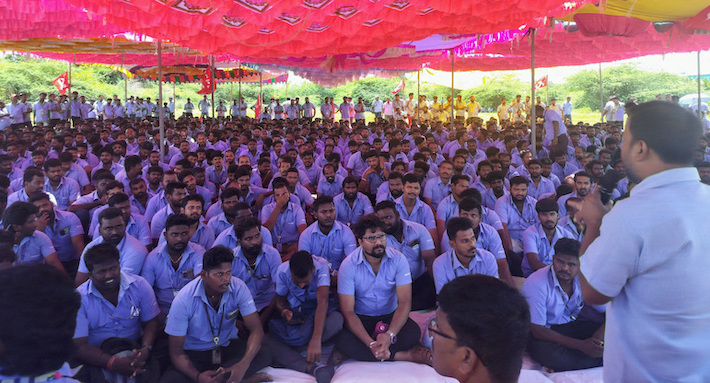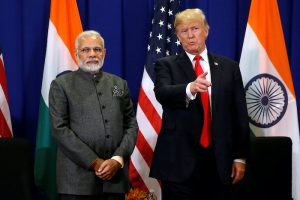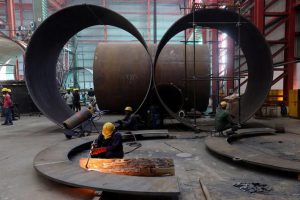Hundreds of Samsung Electronics workers at the Korean company’s base near Chennai in southern India’s Tamil Nadu state have been on an indefinite strike for four weeks.
The strike has cast a spotlight on the industrial policies of the giant conglomerate – one of the world’s biggest chipmakers, as well as the response from local authorities.
Indian police are alleged to have detained 10,000 workers since the strike began on September 9, although most were held only briefly. About 600 workers and union members were arrested on Tuesday for organizing a street protest. A senior police chief said this was because their march caused a public inconvenience.
ALSO SEE: Furore Erupts After EC Agrees to Delay Forest Protection Rule
‘Low wages, long hours’
The workers are seeking a wage increase and want working days capped at eight hours, plus recognition of the factory’s main union, the SIWA-CITU (Samsung India Workers Union, Centre of Indian Trade Unions).
The Sriperumbudur plant near Chennai (formerly Madras), which manufactures TVs, fridges and washing machines, is Samsung’s second-largest in India and generates nearly a third of the company’s annual revenue in the country, which reportedly amounts to $12 billion.
The union says blue-collar workers at Samsung are paid an average of 25,000 rupees (about $300) a month, but want that figure to increase to 36,000 rupees within three years, because it barely pays for their costs of living.
An 11-year Samsung veteran, given the pseudonym of ‘Raja’, aged 41, was quoted by The Hindu as saying: “People talk about rising GDP and inflation, but my economic situation hasn’t improved since I started working here.”
Samsung, which allegedly operated without a trade union for 16 years up to 2023, has been accused of threatening to sack the striking workers, and a range of other questionable tactics to get employees back to work. But the company says it remains open to resolve the dispute via talks.
According to the company, which also operates a factory in Noida, near New Delhi, workers at the Chennai factory earn nearly twice as much as similar workers in the same region.
However, tensions have increased as attempts to negotiate a mutual agreement have failed.
Modi govt’s position questioned
Indeed, the dispute is also drawing attention because of the Modi government’s open support for Samsung, because of its desire to attract international tech giants to the country, and tactics by local authorities seemingly aimed at preventing the union at the Samsung facility being officially registered.
The People’s Democracy website said most of the “heroic” 1,810 permanent workers at the Samsung plant had joined the union because of “precarious working conditions – characterized by low wages, long hours, and a lack of grievance redressal mechanisms.”
In mid-June, they held a general meeting that coincided with an indefinite strike by their Korean counterparts at one of Samsung’s plants in Seoul, where workers are reportedly paid vastly greater wages (over $5,000).
“The irony is that, despite democratic and constitutional framework regarding trade union rights, Samsung has been permitted to establish one of the largest manufacturing bases in India while openly declaring a ‘no-union policy’,” it said.
“This stance implies a disregard for any labour laws enacted by the sovereign Indian parliament or state legislatures.”
Curiously, this dispute is occurring in a region where India’s first union, the Madras Labour Union, was formed over a century ago. That event, in 1918, was followed by enactment of the Indian Trade Union Act of 1926, a law that provided a legal framework for trade unions in India and greater protection of workers’ rights.
Two years after independence, in 1949, Article 19(1)(c) of the Constitution of India guaranteed Indian citizens the right to form associations and unions.
As the left-wing website has noted, the South Korean tech giant, and perhaps the Modi regime, seem greatly out of alignment with India’s long and proud history.
- Jim Pollard
























